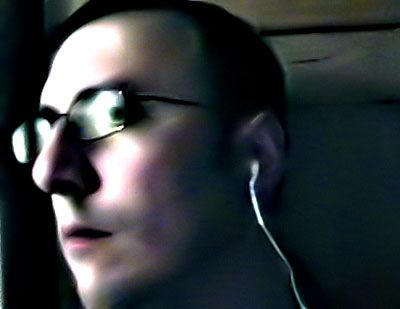Although my father and his wife daven at Chabad (the Conservative shul in his area recently moved out of walking distance, so it's Chabad or stay home for him on Shabbat, and he is shomer Shabbat) I have only talked to Chabad folks in person for about five minutes, and it was almost exactly three years ago.
It was a Sunday, and my girlfriend and I were walking in our town's little downtown, and Chabad guys were there and asked if we were Jewish, and they had us do the blessing and shake the etrog and lulav. Which was rather cool, because they were very happy to see us. It was like they were able to help someone do a mitzvah and that was exciting for them.
But I read chabad.org all the time, and I learn a lot. While I have issues with Orthodoxy in general when it comes to women v men and gay v straight, I LOVE Chabad because they are so dedicated, and I guess because I love the Baal Shem Tov, when you get down to it. I love the way Chassids look at the world.
I love things like this, which I just read in an article about Katrina by Yossi Tauber, the Chabad rabbi in New Orleans:
And then, in a moment of quiet, the teachings of my mentor and teacher, the Lubavitcher Rebbe, ring in my consciousness: "It is wrong to try to explain suffering or to excuse G-d for it, because then we would justify it somewhat. Rather, our role is to help alleviate suffering."
This truth is simultaneously painful and comforting. While we believe there is a "vast eternal plan" we should not attempt to understand the cause for the suffering of others. If we understood, it might become somewhat acceptable. Instead, we must become a partner with our Creator, using our energy and ability to help rather than blame or explain.
There's always these elements that are in tension with the other, as this Chassidic teaching says (referenced at Torah.org :
"a person must always carry around with him two conflicting ideas. In one pocket he must put the sentence "I am dust and ashes" [Bereshis 18:27]. In the other pocket he must place the sentence "For my sake the world was created" [Sanhedrin 37a]."
Sometimes G-d feels so close that I know that G-d has me in the palm of his hand, just like in Psalm 145, which we recite every day as a central part of the afternoon prayer -- "You open your Hand and satisfy the desire of every living thing." G-d feels that close. Closer, really, because of that mind-blowing realization that our bodies and everything we sense is made of G-d. And then, soon enough, sometimes even in the next moment, the very idea of G-d seems silly, because how can those old folks drowned in their beds, little kids buried in earthquake rubble, dying as their lungs are violently crushed, be in G-d's palm at all? We can't contain the opposites comfortably.
It's like the last chapter in Kohelet (Ecclesiastes)and the way it ends -- "fear God and keep His commandments" after warning the young person how they will get old and stop desiring women and return to dust. It was to serve God that we were created, and it is only through doing this we can find meaning in life. When we are confronted by suffering and hunger in this world we must "partner" with G-d. We must be Her eyes and arms and legs and ears in this world. That is why we were created.

3 comments:
Some suggested reading- For Those Who Can't Believe- overcoming obstacles to faith by Harold Shulweis and When Bad Things Happen to Good People By Harold Kushner. Both these books address this issue.
Harold Schulweis is someone I want to get into -- I've loved what I've read of his and what I've seen of him on TV, but I've been lazy about reading him. He's the rabbi emeritus at a local San Fernando Valley synagogue, so I could even see him in person if I really wanted to. So now you've recommended him I have an obligation to read him. :)
I liked the book because he made a case for God without using"the bible says" I reccomended it because he talks about God and the terrible things that happen in the world. How the two coexist.
Post a Comment